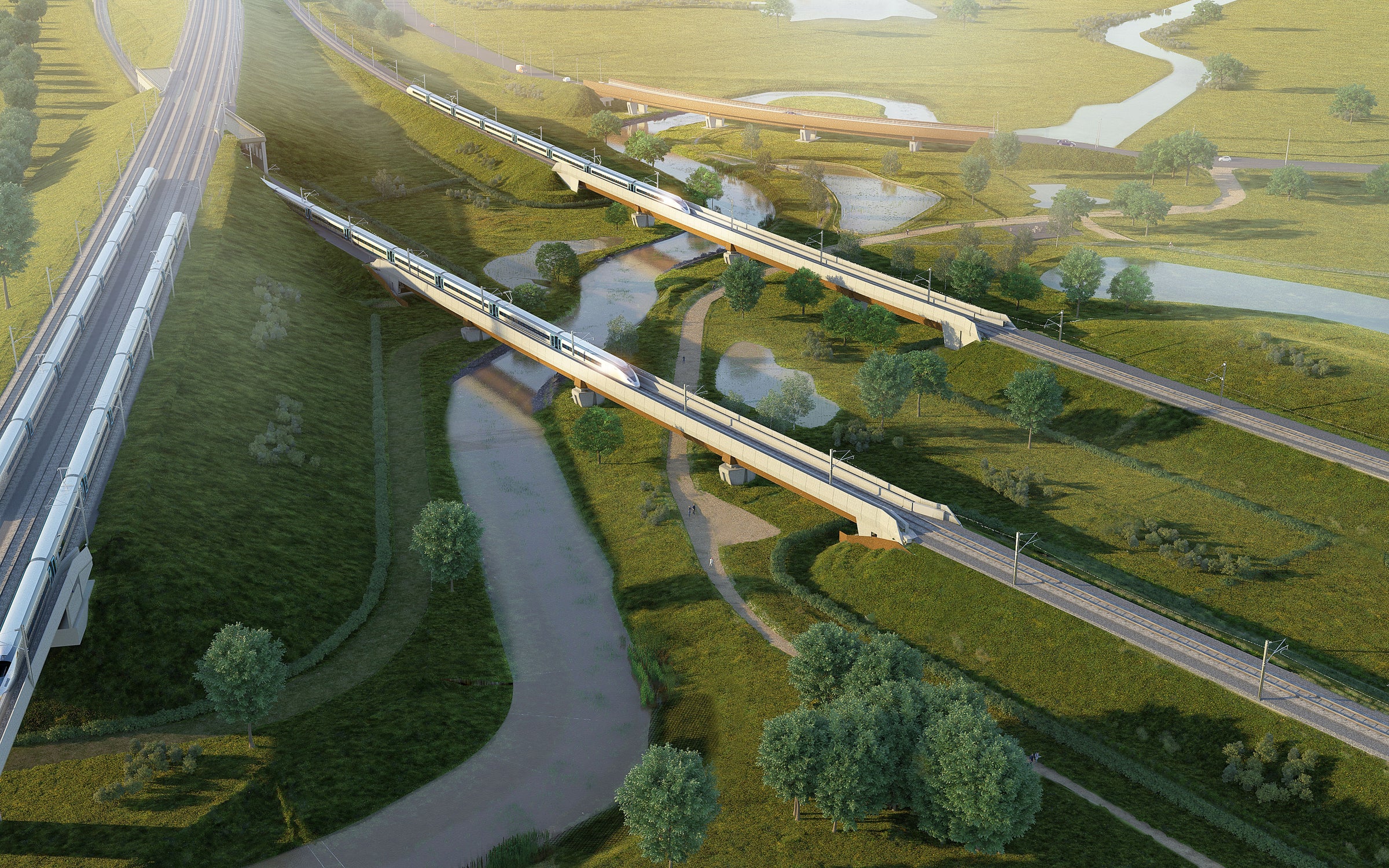‘Years lost and millions wasted’: How HS2’s eastern leg came to hang in balance
Yorkshire and East Midlands are expected to have hugely reduced offering under revised rail plans. So, Colin Drury asks, what went wrong? And what comes next for those places left behind?


For Boris Johnson, it is a transport scheme that appears oven-ready to deliver solutions to two of his biggest challenges.
The eastern leg of HS2 connecting Leeds and Sheffield to Birmingham and London would, advocates say, help level up vast swathes of the East Midlands, Yorkshire and the North East while also reducing the UK’s carbon emissions.
Already £140m has been spent compulsorily purchasing homes along the route. Tens of millions more have been ploughed into surveys and studies.
As a prime minister known for a love of big infrastructure projects, all he has to do is wave it through.
Yet today, it now seems all but certain vast swathes of the project – promised by successive governments for 12 years – are to be effectively mothballed by Mr Johnson.
The upcoming Integrated Rail Plan is expected to back the western route to Manchester but will approve only a small portion of a new line east of the Pennines. Instead, HS2 trains will be directed onto existing track for much of the journey into Yorkshire. It will mean longer travel times, reduced capacity and less opportunity for connections between northern and Midlands cities. A new hub station in Nottinghamshire is to be scrapped altogether.
“Shoestring stuff,” is how one insider labelled the scaled back plans.
So, how – after more than a decade of effort, debate and political will – did we get here? And what does the future now hold for those places likely to be left behind?
The key answer to the first question can probably be summed in one word: money.
The cost of the whole HS2 project has already spiralled to £100bn – triple the original projections. Now, on the back of unprecedented government spending to deal with the Covid-19 pandemic, there appears to be a feeling – in the Treasury perhaps more than Number Ten – that savings have to be made.
“Coronavirus has come along and changed the numbers,” says one northern transport official. “It’s squeezed what they say can be afforded. That’s the guts of it. They are looking to make savings and the sense is that Number 11 especially thinks it prudent to trim back on HS2.”
Why the East Midlands and Yorkshire will lose out, rather than Manchester, is perhaps less simple but two things appear to favour the western leg.
Firstly, Greater Manchester is a far more unified political entity under the mayoralty of Andy Burnham than those regions which would benefit from an eastern line. It meant that, while a rough route and destination were quickly decided on west of the Pennines, local authorities on the parallel side spent years squabbling about where the line should run and where stops should be located. Protracted local debates about if Sheffield and Nottingham should have stations bogged things down. Next door to Leeds, Wakefield City Council actually lobbied the government to spike the whole thing amid fears it would harm its own London connection.
Secondly – and probably of greater importance – the cost-benefit analysis that government applies to major spending decisions famously favours more economically prosperous regions where each pound coughed up by the taxpayer generates more private investment. In this way, Greater Manchester was always likely to be considered to offer greater bang for buck.
Yet critics argue that the whole point of levelling up – and of HS2 – was not just to benefit the biggest cities but to drag up those smaller so-called left-behind towns.
For them, if Boris Johnson is serious about levelling up, he must make sure the eastern leg happens.
“Take Goldthorpe, for instance,” says Henri Murison, director of the Northern Powerhouse Partnership. “This is one of those places crying out for investment, right? Well, HS2 could unlock that because it frees up capacity [on the current network] to really improve its connections into places like Leeds and Sheffield. And there are so many towns like that on this line.
“But if we give the region a second class HS2 we consign those towns to a second class levelling up and a second class economic future.”
Murison himself believes the line will not be completely mothballed because it would be an “economic disaster, levelling down not levelling up, years lost and millions wasted”.
But even simple scaling down – which he himself believes is most likely – could have a devastating impact on the region’s potential for growth.
Some 150,000 new jobs are dependent on the “transformative change” the eastern HS2 leg would bring, according to one report. Without it – or with a cut-price version – those figures look all but impossible to achieve. The same report – composed by the HS2 East Group – suggests the Leeds City Region alone will lose £1.7bn every year that the project is delayed.
“These are not small figures,” says Murison. “Those kinds of numbers change lives for the better.”
Likewise, climate change targets on transport appear to be increasingly difficult without new capacity on the railways.
HS2 would cut annual carbon emissions from car travel by over 40,000 tonnes, according to government figures. It would take away 1.2 million car miles every day. Take a significant chunk of the line away and those numbers suddenly become significantly smaller.
“Building HS2 to Leeds is critical to address the clime change, better connect our towns and cities and transform our economies to the tune of billions of pounds a year,” says Jim McMahon, Labour’s shadow transport secretary. “If the Tories go back on their word, communities will feel rightly left behind.”
He points out that his party has committed to both legs – but this is not necessarily a party political issue.
Conservative MPs across the region – many of who were elected for the first time in 2019 – are every bit as furious at the possible downgrading.
In the introduction of that August report, Ben Bradley – MP for Mansfield and leader of Nottinghamshire County Council – declared that “failing to deliver the eastern leg in full will hold back the economic prosperity of our regions and communities for future generations”.
For him, as well as other MPs, civic leaders, businesses and millions of ordinary people across the north, 12 years of plans now comes down to a waiting game of days and weeks.
What the Treasury and Downing Street decide in that time will alter the face of the north – one way or another – for generations to come.






Join our commenting forum
Join thought-provoking conversations, follow other Independent readers and see their replies
Comments